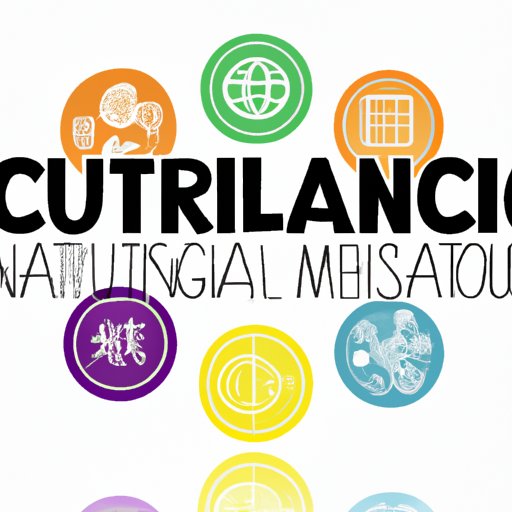Introduction
Cultural intelligence (CQ) is the ability to understand, appreciate, and interact effectively with people from different cultures. It is becoming increasingly important in the 21st century as the world continues to become more interconnected and globalized. As people move across borders and work together in an ever-shrinking world, they are faced with the challenge of navigating diverse cultural contexts and successfully engaging with individuals from different backgrounds. This article will explore why cultural intelligence is important and how it can be used to facilitate effective intercultural communication and conflict resolution.

Analyzing the Impact of Cultural Intelligence on Intercultural Communication
In order to effectively communicate with someone from another culture, it is essential to have an understanding of their values, beliefs, and customs. Without this knowledge, it is easy to misinterpret messages or cause offense. Cultural intelligence enables individuals to better recognize and appreciate cultural differences and use them to bridge gaps in communication.
Cultural intelligence also helps individuals adapt to new environments by providing insights into the norms and behaviors of different cultures. By understanding these cultural nuances, individuals can better navigate unfamiliar situations and adjust their communication style accordingly. This is especially beneficial when working in diverse teams, as it helps to create a sense of mutual respect and understanding among team members.
Examining the Benefits of Cultural Intelligence in a Globalized World
In today’s globalized world, cultural intelligence is essential for success. It enables individuals to develop cross-cultural competency, which is the ability to interact effectively with people from different cultures. As countries become increasingly interconnected, having a strong understanding of different cultures is invaluable for those looking to advance their careers and gain a competitive edge in the job market.
Cultural intelligence also facilitates global mobility by allowing individuals to adapt quickly and easily to new environments. By understanding the cultural norms and expectations of different countries, individuals can more easily transition and fit in with local communities. This can be particularly helpful for those who travel often for work or study.

Exploring How Cultural Intelligence Helps Organizations Adapt to New Markets
In addition to helping individuals, cultural intelligence is essential for organizations that are looking to expand into new markets. Having a deep understanding of the cultural context of a new country can help organizations develop effective strategies for entering the market and building relationships with potential customers. This includes understanding local customs and practices, as well as the language, values, and beliefs of the people living in the area.
By utilizing cultural intelligence, organizations can create marketing campaigns that are tailored to the specific needs and wants of their target audience. This allows them to better engage with customers and build trust in the brand. Additionally, it can help organizations avoid costly mistakes that could otherwise damage their reputation.
Understanding the Role of Cultural Intelligence in Cross-Cultural Business Negotiations
Cross-cultural business negotiations require an in-depth understanding of the cultural context of both parties involved. Cultural intelligence can help negotiators appreciate the cultural contexts of each side and use this knowledge to reach agreement. This can include recognizing the importance of nonverbal cues, understanding the different communication styles of each party, and taking into account any religious or cultural taboos that may be relevant.
By utilizing cultural intelligence, negotiators can better understand the motivations and perspectives of each party and find common ground for collaboration. This can lead to more successful negotiations and stronger, long-term partnerships.
Investigating the Relationship Between Cultural Intelligence and Conflict Resolution
Cultural intelligence can also play an important role in conflict resolution. In intercultural disputes, it is essential to be aware of cultural differences and how they can affect the way people perceive and respond to different situations. By utilizing cultural intelligence, individuals can better recognize and mitigate misunderstandings that could otherwise escalate into full-blown conflicts.
Additionally, cultural intelligence can help individuals resolve conflicts more effectively by enabling them to understand the other party’s perspective and come up with solutions that are acceptable to both sides. This can lead to more peaceful and mutually beneficial outcomes.

Evaluating the Relevance of Cultural Intelligence in Educational Settings
Cultural intelligence is also becoming increasingly important in educational settings. With the rise of globalization, there is a growing need for students to be culturally literate and able to navigate different cultural contexts. By teaching cultural intelligence, educators can equip students with the skills they need to succeed in a globalized world.
Cultural intelligence can also help foster a more inclusive environment in schools by encouraging students to embrace diversity and respect different cultures. This can lead to a more harmonious learning environment and better collaboration between students from different backgrounds.
Conclusion
Cultural intelligence is essential for navigating and succeeding in a globalized world. It has a profound impact on intercultural communication, enabling individuals to better understand and appreciate cultural differences. It also provides numerous benefits to organizations, including improved cross-cultural competency, enhanced global mobility, and more effective strategies for entering new markets. Additionally, it plays an important role in business negotiations and conflict resolution. Finally, it is becoming increasingly relevant in educational settings, as students need to be equipped with the skills to succeed in a globalized world.
Cultural intelligence is a valuable asset that can help individuals, organizations, and educational institutions succeed in a globalized world. By developing and utilizing this skill, individuals can bridge cultural divides, build meaningful relationships, and create a more harmonious and prosperous future.
(Note: Is this article not meeting your expectations? Do you have knowledge or insights to share? Unlock new opportunities and expand your reach by joining our authors team. Click Registration to join us and share your expertise with our readers.)
